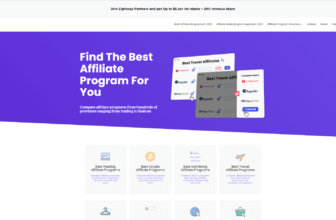
The Affiliate Marketer’s Guide to Content Marketing
As an affiliate marketer, your success depends on your ability to drive traffic and generate sales. One of the most effective ways to achieve this is through content marketing. In this guide, we will provide you with a comprehensive overview of content marketing for affiliate marketers, covering everything from creating quality content to promoting it.
Table of Contents
- Introduction
- What is Content Marketing?
- Why Content Marketing is Essential for Affiliate Marketers
- Identifying Your Target Audience
- Creating a Content Strategy
- Types of Content That Work Best for Affiliate Marketing
- Creating Quality Content
- Search Engine Optimization (SEO) for Affiliate Marketers
- Promoting Your Content
- Measuring Your Results
- Tips for Successful Content Marketing for Affiliate Marketers
- Common Content Marketing Mistakes to Avoid
- Conclusion
- FAQs
1. Introduction
As an affiliate marketer, you know that generating traffic to your website is crucial for your success. However, simply attracting visitors to your site is not enough; you need to engage them with your content to build trust and establish a relationship with your audience. This is where content marketing comes in. By creating quality content that provides value to your target audience, you can establish yourself as an authority in your niche and ultimately drive more sales. In this article, we will explore the ins-and-outs of content marketing for affiliate marketers, including why it’s essential, how to create effective content, and common mistakes to avoid.
2. What is Content Marketing?
Content marketing is a strategic approach to marketing that involves creating and distributing valuable and relevant content to attract and engage a target audience, like this blog (hopefully).. This type of marketing aims to provide useful information or entertainment to potential customers, rather than directly promoting a product or service. The content can come in many forms, such as blog posts, videos, social media posts, infographics, and more. The goal of content marketing is to establish a relationship with your audience by providing them with valuable information or entertainment that aligns with their interests and needs. When done effectively, content marketing can increase brand awareness, drive traffic to your website, and ultimately lead to more conversions and sales.
3. Why Content Marketing is Essential for Affiliate Marketers
Content marketing is essential for affiliate marketers due to its ability to address several critical aspects of online marketing. Firstly, content marketing allows affiliate marketers to establish themselves as trusted authorities in their respective niches. By providing valuable and relevant content that helps solve the problems of their target audience, affiliate marketers can position themselves as experts in their field. As a result, customers are more likely to trust their recommendations when it comes to purchasing products or services.
Secondly, content marketing is an effective way to drive traffic to your website. By creating quality content that appeals to your target audience, you can attract new visitors to your site. The more traffic you generate, the higher the likelihood of making sales and generating revenue.
Finally, content marketing can help affiliate marketers retain their existing customers by providing them with ongoing value. By creating and sharing relevant and engaging content, affiliate marketers can keep their customers engaged and coming back for more. This leads to increased loyalty, repeat purchases, and ultimately, increased revenue.
4. Identifying Your Target Audience
One of the critical aspects of content marketing for affiliate marketers is identifying their target audience. Before creating content, it’s important to understand who your ideal customer is, what their needs are, and what type of content they consume.
To identify your target audience, start by creating buyer personas that represent your ideal customers. These personas should include demographic information such as age, gender, location, and income, as well as psychographic information such as interests, values, and pain points.
Once you have a clear understanding of your target audience, you can tailor your content to meet their needs and preferences. For example, if your target audience is primarily interested in video content, focus on creating high-quality video content that engages and informs them. If your audience is more interested in written content, focus on creating in-depth blog posts or articles that provide them with valuable information.
By identifying your target audience and creating content that resonates with them, you can increase engagement and ultimately drive more sales for your affiliate marketing business.
5. Creating a Content Strategy
Creating a content strategy is a critical step for affiliate marketers to ensure that their content is aligned with their business goals and resonates with their target audience. A well-defined content strategy can help guide your content creation efforts and ensure that you are consistently delivering high-quality content to your audience.
To create a content strategy, start by setting specific goals for your content marketing efforts. Do you want to increase website traffic, generate more leads, or boost sales? Whatever your goals may be, make sure they are specific, measurable, and achievable.
Next, define your brand voice and tone. This includes the language you use, the personality you convey, and the emotions you evoke through your content. Your brand voice and tone should be consistent across all your content to build brand recognition and trust.
Choose the types of content you will create based on your target audience’s preferences and your business goals. Will you focus on blog posts, videos, social media content, or a combination of these? Ensure that the content you create is of high quality and aligned with your brand voice and tone.
Finally, determine how you will measure the success of your content marketing efforts. This could include tracking website traffic, engagement metrics, or conversion rates. Analysing the data and insights you gather will help you refine your content strategy and optimise your future content creation efforts.
6. Types of Content That Work Best for Affiliate Marketing
As an affiliate marketer, it’s important to choose the right types of content to promote your affiliate products effectively. Certain types of content work best for affiliate marketing, such as blog posts, product reviews, how-to guides, and tutorials.
Blog posts are a great way to provide valuable information to your audience while also promoting your affiliate products. By creating high-quality blog content, you can establish yourself as an authority in your niche and build trust with your readers.
Product reviews are another effective type of content for affiliate marketers. These reviews can be in-depth or brief, but they should provide honest opinions and insights about the product you are promoting. Be sure to highlight the benefits and drawbacks of the product and provide your readers with a clear call-to-action.
How-to guides and tutorials are also popular types of content for affiliate marketers. These types of content are particularly effective for promoting products that require a certain level of expertise or knowledge to use. By providing your audience with step-by-step instructions on how to use the product, you can help them see the value in purchasing it.
It’s important to note that the type of content you choose should align with your content strategy and target audience. Ensure that the content you create provides value to your audience and is aligned with your brand voice and tone. By creating high-quality content that resonates with your target audience, you can effectively promote your affiliate products and drive sales.
7. Creating Quality Content
Creating quality content is one of the most important aspects of content marketing. Quality content means that your audience finds your content valuable, informative, and engaging. When your audience finds your content valuable, they are more likely to engage with it, share it, and ultimately become loyal customers.
To create quality content, you should first consider the needs and pain points of your target audience. What kind of information are they looking for? What questions do they have? By understanding your audience, you can create content that addresses their needs and provides them with the information they are looking for.
In addition, your content should be well-written, free of errors, and easy to read. Use clear and concise language, and avoid using technical jargon or complex terms that may be difficult for your audience to understand.
It’s also important to ensure that your content is optimised for search engines. This means using relevant keywords and phrases throughout your content, including in your headlines, subheadings, and body copy. By doing so, your content will be more easily discoverable by your target audience when they search for information related to your niche.
Overall, creating quality content takes time and effort, but it is a crucial component of successful content marketing. When done correctly, quality content can help you build trust and establish yourself as an authority in your niche, while also driving traffic to your site and ultimately increasing your conversion rates.
8. Search Engine Optimization (SEO) for Affiliate Marketers
Search Engine Optimization (SEO) involves optimising your website and content to improve its ranking in search engine results pages (SERPs). This is important because most internet users rely on search engines to find what they are looking for online. As an affiliate marketer, you need to ensure that your content is easily discoverable by your target audience.
To optimise your content for search engines, you need to identify the keywords and phrases that your target audience is searching for. These keywords should be relevant to your content and your affiliate products. You can use keyword research tools to identify relevant keywords and analyse their search volume and competition.
Once you have identified your target keywords, you can incorporate them into your content in a natural and strategic way. This includes using the keywords in your title tags, meta descriptions, headings, and throughout your content. However, it is important to avoid keyword stuffing, which can harm your search engine rankings and make your content appear spammy.
In addition to using keywords, you can also optimise your content by improving its structure, formatting, and other technical aspects. This includes improving your website’s loading speed, using descriptive URLs, and ensuring your content is mobile-friendly.
9. Promoting Your Content
Once you have created quality content that is optimised for search engines, the next step is to promote it to ensure that it reaches your target audience. There are many ways to promote your content, and it is essential to have a plan in place to ensure that you are using your time and resources effectively.
One effective way to promote your content is through social media. You can share your content on your social media profiles and encourage your followers to share it with their networks. This can help you increase your reach and drive more traffic to your site.
Another way to promote your content is through email marketing. You can send your content to your email list and encourage them to share it with their networks. This can help you reach a wider audience and drive more traffic to your site.
Paid advertising is another effective way to promote your content. You can use platforms like Google Ads and Facebook Ads to target your ideal audience and drive traffic to your site. This can be a great way to get your content in front of people who are interested in your niche.
In addition to these methods, it is also important to build relationships with other bloggers and influencers in your niche. By collaborating with others and sharing each other’s content, you can increase your reach and drive more traffic to your site.
10. Measuring Your Results
Measuring your results is a crucial step in content marketing as it helps you determine the effectiveness of your strategy. By measuring your results, you can identify what is working and what needs improvement. There are several metrics you can track to measure the success of your content marketing efforts, including website traffic, engagement rates, and conversion rates.
Google Analytics is a popular tool used to track website traffic and user behavior. You can use it to monitor the number of visitors to your site, how long they stay on your site, which pages they visit, and where they come from. This information can help you identify which types of content are attracting the most visitors to your site and which pages are driving the most conversions.
Engagement rates are also an important metric to measure. This includes metrics such as social media engagement, comments on your blog posts, and email open rates. By measuring your engagement rates, you can determine how well your content is resonating with your audience and make adjustments to improve engagement.
Conversion rates are another crucial metric to measure. This refers to the percentage of visitors who take a desired action, such as making a purchase or filling out a form. By tracking your conversion rates, you can determine which types of content are driving the most conversions and optimize your strategy accordingly.
Overall, measuring your results is an essential step in content marketing. By tracking your metrics, you can identify what is working and what needs improvement, allowing you to continually refine and improve your strategy for optimal results.
11. Tips for Successful Content Marketing for Affiliate Marketers
Here are some tips for successful content marketing for affiliate marketers:
- Stay focused on your niche and target audience
- Be consistent with your content creation and promotion
- Use storytelling to make your content more engaging
- Leverage social media to reach a wider audience
- Use visuals like images and videos to make your content more appealing
- Always disclose your affiliate relationships to maintain transparency and trust with your audience
12. Common Content Marketing Mistakes to Avoid
Here are some common content marketing mistakes to avoid:
- Creating low-quality or irrelevant content
- Focusing too much on self-promotion rather than providing value to your audience
- Not optimising your content for search engines
- Ignoring the importance of building relationships with other bloggers and influencers in your niche
- Not measuring and analysing your results to improve your strategy
13. Conclusion
In conclusion, content marketing plays a vital role in the success of affiliate marketers. By creating valuable and relevant content, affiliate marketers can attract and engage their target audience, establish trust and authority, drive traffic to their websites, and ultimately generate more sales. However, it is important to identify your target audience, create a content strategy, optimise your content for search engines, and promote it effectively to achieve maximum impact. By measuring your results and continuously improving your content, you can achieve long-term success as an affiliate marketer.
14. FAQs
Can I use content marketing for any niche as an affiliate marketer?
- Yes, you can use content marketing for any niche as an affiliate marketer. The key is to identify your target audience and create content that meets their needs.
How often should I create new content for my website?
- The frequency of your content creation depends on your niche and your audience’s needs. You should aim to create quality content consistently to keep your audience engaged and attract new visitors to your site.
Is it essential to use SEO for content marketing?
- Yes, search engine optimisation (SEO) is essential for content marketing to ensure your content is discoverable by your target audience when they search for relevant keywords.
Should I disclose my affiliate relationships to my audience?
- Yes, it is essential to disclose your affiliate relationships to maintain transparency and trust with your audience.
What is the best way to promote my content?
- There are several ways to promote your content, including social media marketing, email marketing, influencer outreach, guest posting on other websites, and paid advertising. The best approach depends on your niche and target audience, so it’s essential to experiment with different promotion methods and track their effectiveness.
- The best way to promote your content is to use a combination of social media, email marketing, paid advertising, and building relationships with other bloggers and influencers in your niche.
- A Full Guide to The Adidas Affiliate Program - 23 July 2024
- Louis Vuitton Affiliate Program Alternatives: 8 High-End Fashion Affiliate Programs - 16 July 2024
- Discover the Power of MioMedia’s Affiliate Program - 16 July 2024








